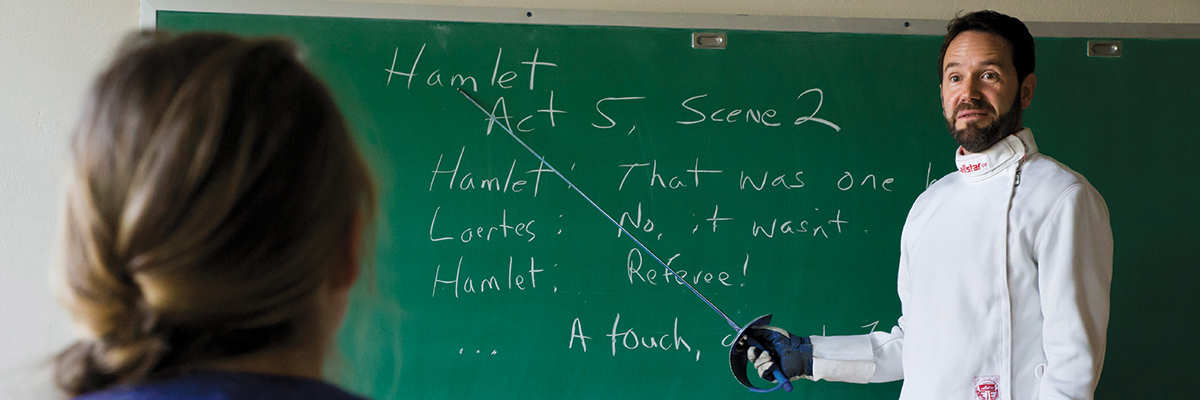It’s no secret that Associate Professor of English Peter Grandbois is an accomplished writer: He’s been nominated for a Pushcart Prize; his book, Nahoonkara, was awarded a gold medal in 2011 as the Foreword Book of the Year; and in 2013, Domestic Disturbances, Grandbois’ short-story collection, was a finalist for another Foreward Prize. And if all that is not enough, his first novel, The Gravedigger, is set to be filmed in Mexico. But we sat down to chat with the professor about a completely different skill set.
After taking nearly 20 years off from fencing competitively, Grandbois, once the third-best foil fencer in the country, has returned to the sport (with style, we might add). After winning two national tournaments, Grandbois has qualified for a spot on the U.S. team for the Veterans’ World Championships this fall in Hungary. In doing so, he accomplishes a lifelong goal and simultaneously proves that professors do, in fact, have lives off campus.
How did you start fencing? I’ve always loved sword fighting. When I was younger, I would try to play hooky from school to watch old Errol Flynn movies. I loved the sport but didn’t know it was “real” until my freshman year at the University of Colorado. Like Denison, we had a fencing club, but an honest-to-goodness, true French fencing master coached it. We became (and still are) best friends. He’s actually one of my main competitors.
How do most people react when they find out that you have this talent? Most Americans don’t know anything about fencing. If you Google it you get things like electric fencing, chain-link fencing, and picket fencing. The U.S. Fencing Association says it’s the fastest growing sport in America, though. Columbus is actually hosting the national championships in June. I’ll be fencing there with 10,000 other entrants—all those people will be walking around downtown, with swords.
We know that you are also an award-winning author. Is fencing related to your writing at all? I have a very obsessive and disciplined personality. Once I stopped fencing, writing started to take over. My first-ever published story, “All or Nothing at the Fabergé,” has autobiographical elements in it from the 1994 World Cup. I also wrote a short memoir called The Arsenic Lobster, dealing primarily with my life in fencing. I’m currently working on its sequel, Kissing the Lobster, which details my return to fencing and looks at what it means to grow older.
What made you want to go back to competition after taking close to 20 years off? My kids. A year and a half ago, Santi (9) and Olivia (13) started fencing—maybe I talked them into it a little bit. I love watching them in the uniform, smiling, sometimes stabbing me. But I wanted to compete again. The coaches at the club told me about a veterans’ division for fencers over 50. I decided to go for it. I just turned 50 this spring, which means that I am the young guy. I’ve seen people in their 80s fence. The oldest person I’ve fenced was 70-something … that might be me someday!
After being a three-time first alternate for the U.S. World Championship team, how did it feel to make the team? I felt giddy. It didn’t matter that it was for the old guys. I finally did it. Any regret I had from the past disappeared. In some ways, the sport feels more fun now. It’s a dream come true.

